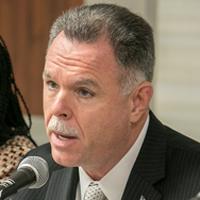Chicago OKs stop-and-frisk pact with ACLU

Garry McCarthy, superintendent of the Chicago Police Department. ABA Journal file photo by ©Kathy Anderson.
Responding to claims by a civil rights group that Chicago police disproportionately target blacks for “stop-and-frisk” searches based on reasonable suspicion, the city has agreed to a settlement that involves third-party monitoring.
Announced Friday, the pact incorporates many of the suggestions in a March 2015 report (PDF) by the American Civil Liberties Union of Illinois. It requires city police to document and share data about stops with the ACLU and a former federal magistrate judge, Arlander Keys, according to the Associated Press and Reuters. Twice-a-year reports by Keys will evaluate whether the stops are in compliance with civil rights law.
Facts that will be recorded and monitored include the gender, race and ethnicity of those stopped, as well as the reason for the stop-and-frisk and its outcome. The police department will enhance its training about appropriate stops and monitor and discipline those who violate procedures.
“What we have done here is move past the litigation process and advanced directly to a collaborative process,” said Harvey Grossman. He is legal director of the ACLU of Illinois.
While the ACLU didn’t sue, however, six individuals did, in the aftermath of the ACLU’s March report. The Chicago Tribune (reg. req.) reported in April on their federal civil rights litigation. Since then, another 40 individuals have joined in the class-action lawsuit, USA Today says.
Attorney Antonio Romanucci represents one of the original plaintiffs, Darnell Smith. He alleges he was stopped and frisked without reason as he waited outside his grandparents’ home on the city’s South Side for a food delivery.
While the settlement announced today resolves many of Smith’s concerns, he doesn’t intend to drop his case, Romanucci told USA Today.
“This practice affected so many people for such a long period of time that we have to make sure that this agreement that’s in place remains enforceable,” Romanucci said. “The one way to do that is to continue ahead with our lawsuit … and ensure that what the city says it actually will do.
Chicago’s police superintendent, Garry McCarthy, said: “It is imperative that we use every tool and resource in a way that is not only lawful but respectful of the residents we serve,” Reuters reports.
However, McCarthy also said at a news conference that he is confident his officers already are in compliance with constitutional standards and is concerned that the extra paperwork will reduce their time on the street, the AP article notes. “It’s not going to be a change in the actual way that we stop people, it’s going to be a change in the way that we record the stop,” McCarthy said of the new procedures.
The new procedures take effect immediately, USA Today reports.
Protracted litigation has occurred in New York City in recent years over police stop-and-frisk tactics there. The stops are controversial both because of a claimed focus on minorities and because the reasonable suspicion required for such stops is a lesser standard than the probable cause required for arrests.
Related coverage:
Legal Zoom (2009): “When Can the Police Stop and Frisk You on the Street?”
See also:
ABA Journal: “Has ‘stop and frisk’ been stopped?”
ABAJournal.com: “NYC proposes settlement in stop-and-frisk cases; police union has ‘serious concerns’”
ABAJournal.com: “State AG: Only a small fraction of stop-and-frisks end with convictions; NYC: Report is ‘flawed’”
ABAJournal.com: “How can tensions between minorities and police be addressed? Reforms proposed”
Write a letter to the editor, share a story tip or update, or report an error.


